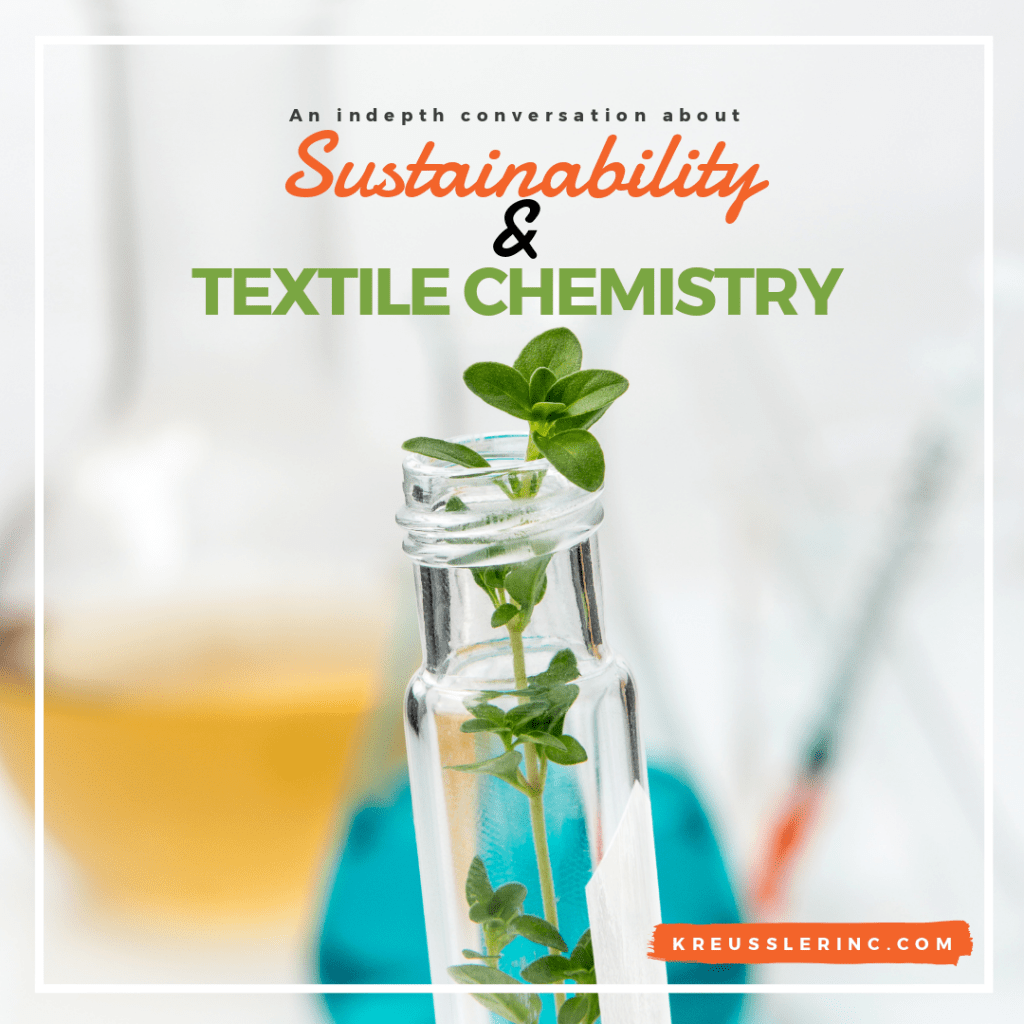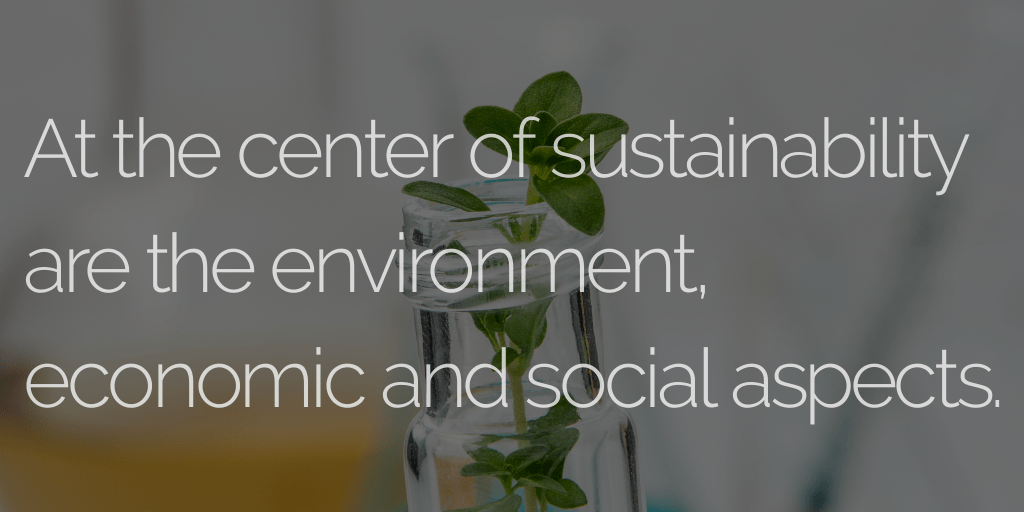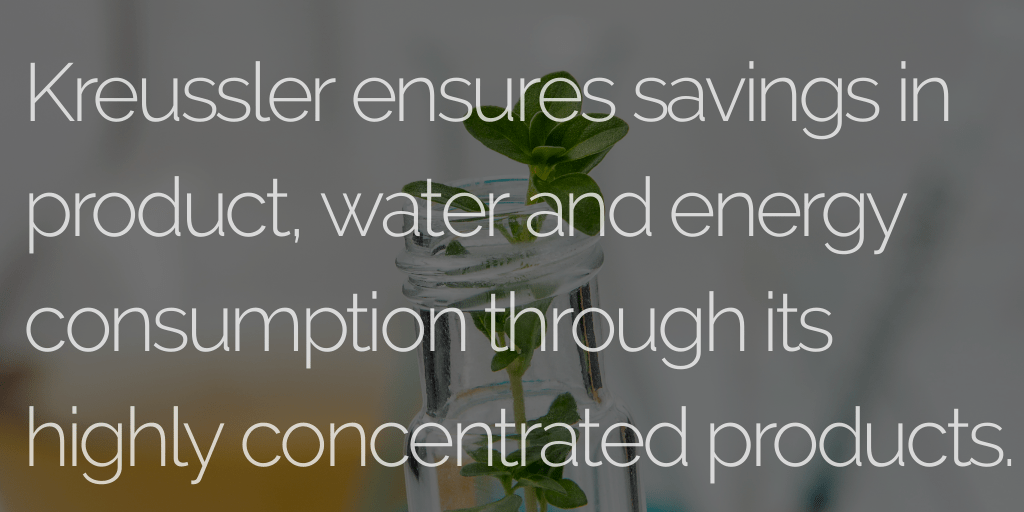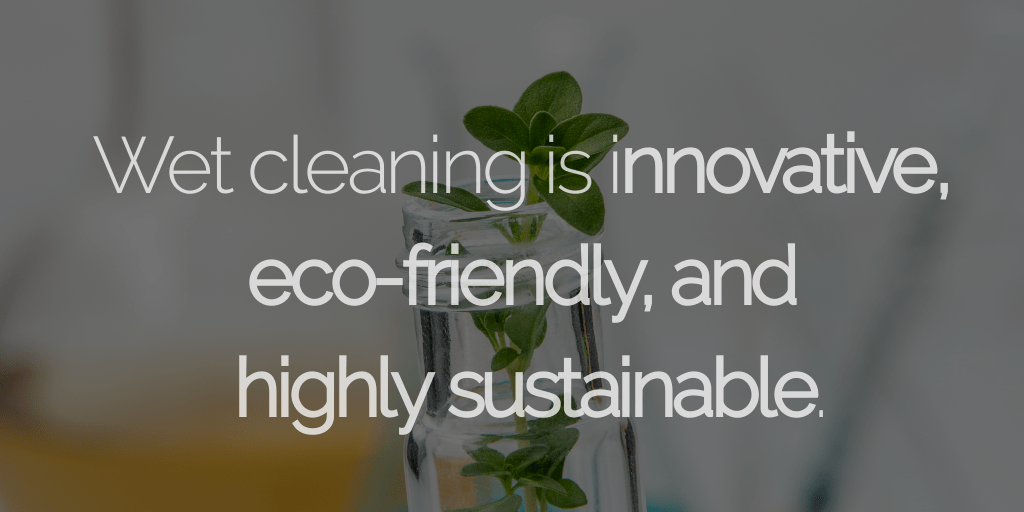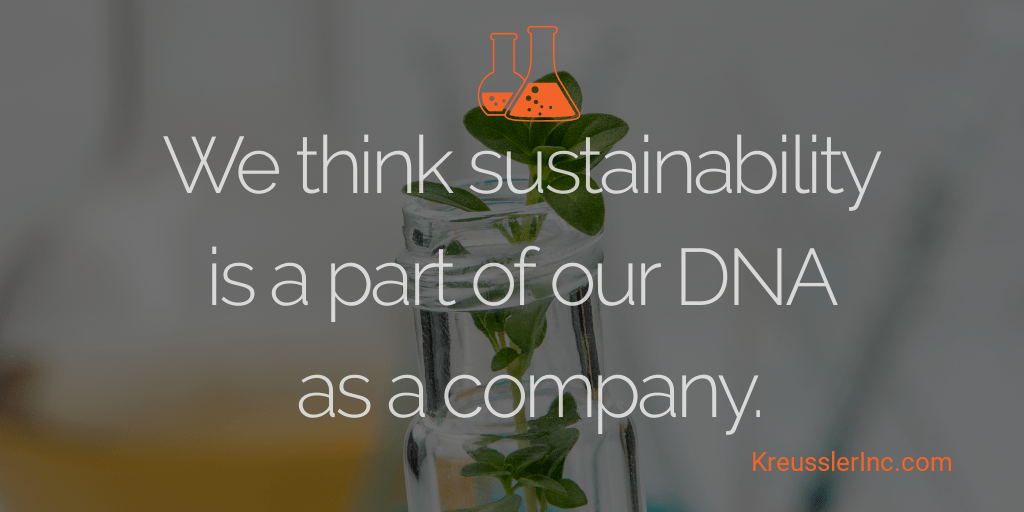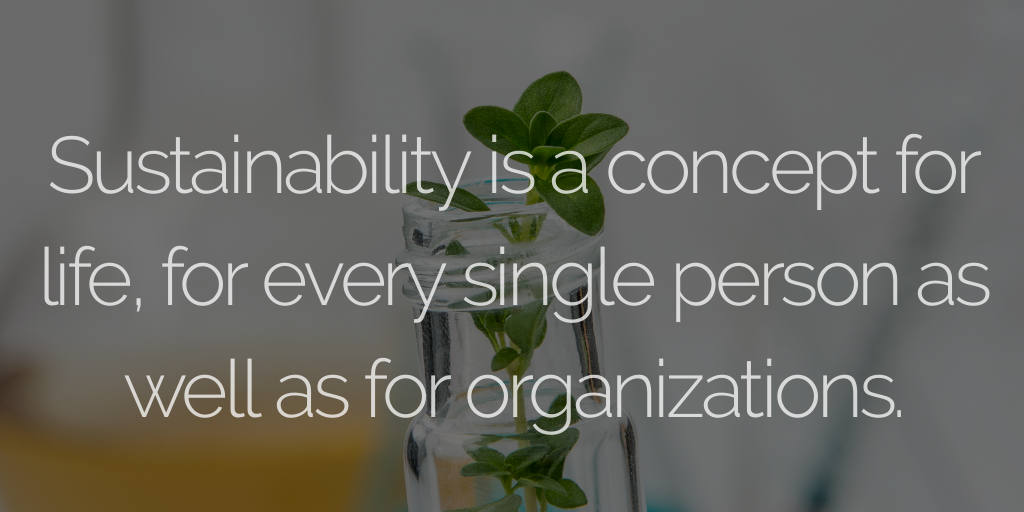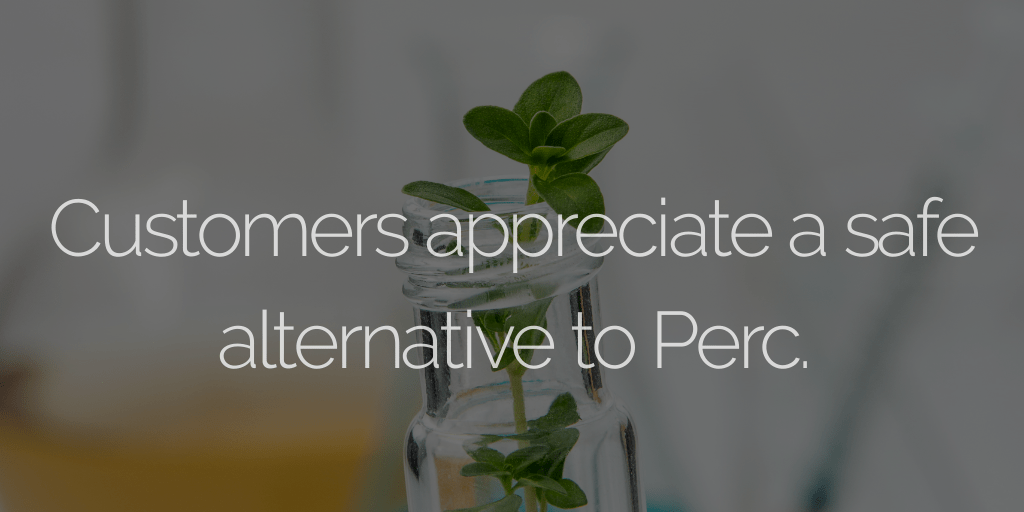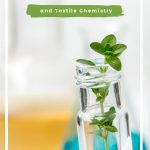This month we’re pleased to share a conversation between Richard Fitzpatrick, Vice President of Kreussler Inc., Dr. Manfred Seiter – Technical Director for Textile Chemistry, Kreussler GmbH, and, Mr. Thomas Zeck – Commercial Director, Kreussler GmbH – about sustainability in the textile chemistry industry and Kreussler’s sustainable business practices. We wanted to share how Kreussler is a sustainable company and what that means to us as a company. We’re thrilled to have two of our senior German management team to share the global view of Kreussler GmbH and overview sustainability in the European market.
A brief explanation of what sustainability is from Dr. Seiter, “The definition of sustainability is going back to 1713 Hans Carl v. Carlowitz, he was in charge as a minister for the mining industry in Saxonia.
In that time they needed a lot of wood to stabilize the mines and wood was the main energy source for metal smelters and heating the houses in winter. As a consequence of high energy demand and a rapidly growing population, there was a shortage of wood not only in Saxonia, also in many other European countries. He wrote a book about forest economy and used the wording sustainability and protection of nature for the first time.”
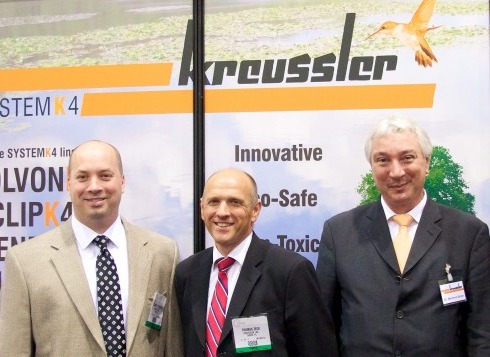
Richard: The term sustainable is popular and verging on overused. We see it in marketing claims [which are not always substaniated] to consumer goods, packaging, farming, and even textiles with sustainable fabrics and dying. Is sustainability a new concept for Kreussler and what does it mean to us?
Dr. Manfred Seiter: Our mission is to manufacture excellent, highly efficient products which give benefit and value to our customers in professional textile care. For decades our Research and Development Department has been working hard to fulfill the demands of our customers.
Kreussler is a family-owned company with a long tradition. We have highly educated experts in our labs, and whatever we do, our activities are planned long-term. So it is nothing special, and it is not new to us. We are a chemical company trying to be sustainable as a principle. We think our clients will benefit if companies try to do things right.
Thomas Zeck: Indeed, sustainability is in the center of communication in nearly every industry. This underlines the importance and necessity of sustainability. On the other hand, it risks becoming a phrase. This would be comparable to what we saw with the erosion of terms like “green” and “bio” and “eco-friendly.“ In the end, it led to total consumer confusion, ignorance, or even worse indifference.
Therefore we should be very sensitive when we use this term, ask ourselves about an appropriate definition of sustainability and how we (Kreussler) defines its sustainability mission and makes it part of its culture and value system.
Like Manfred stated, the roots of its meaning are going back to Hans Carl von Carlowitz (1645–1714). There are other definitions that put the focus more on economics. Sustainability means, for example, “not solely focus activities to generate profits, which then flow into environmental and social projects, but to generate profits already environmentally and socially acceptable.” (Pufé 2014, p.16). The decisive factor here is that sustainable development should not be supported by the financial support, but must instead finance itself. Sustainable development is not helped if the funds for investment have been won in ways that conflict with the idea of sustainability.
These discussions are often based on the definition of the Brundtland Commission “Humanity can make development sustainable – to ensure that it meets the needs of the present without compromising the ability of future generations to meet their own needs.”
Kreussler understands sustainability as a form of environmental and economic activity that is intended to ensure comparable or better-living conditions for present and future generations by carefully applying the appropriate element and protecting it accordingly. At the center of sustainability are the environment, economic and social aspects.
Richard Fitzpatrick: Although it’s evident that sustainable business practices are part of Kreussler’s core mission, we don’t seem to use the word sustainable a lot in our forward-facing messages. Is that a conscious effort for us as a company to operate sustainably, but not make it one of our cornerstones of our forward-facing messaging?
Dr. Manfred Seiter: I think maybe the wording of sustainability, it’s very old wording used for decades or centuries in the meantime, but companies with a long tradition, in the end, if they are still alive and active, they follow the principles of sustainability all the time because it’s a part of their daily life. And sustainability in principle has three components: a social component, an environmental component, and economic. While we do not focus predominantly on sustainability, but I think, like many other companies, we do it in our daily work. If companies have a long-lasting target, if they like to meet the customer demands, they have to act sustainably. And so we also do it for many, many, many years, and it’s one part of our daily job, of our daily life.
Thomas Zeck: Sustainability is something which must be communicated more internally and externally and put more into the focus of communication, but also I have to agree to Manfred that sometimes it’s better to live it and to make something out of that concept than try to communicate it.
Today we are in an environment where you have to do both and where you also have to go more into the focus of communication with all concerned stakeholders that they understand what sustainability means for a company like us, a medium-sized company because there are so many differences between the definitions of sustainability. I agree with what Manfred say, whatever definition you will take as a guide for you, it has to carry those three elements, that means not only be focused on the environmental. It is also the social aspect, which also becomes more important, at least as important as the environmental aspect, and then you have to bring it in compliance with the economic aspect because of the short-term thinking. The challenge is to make it part of your culture, to make it part of your wider system.
88% of SOLVONK4 is naturally sourced. SOLVONK4 is the first bio-based dry cleaning solvent ever. #biobased #sustainable #drycleaning Share on XRichard Fitzpatrick: Are there some examples of how we have brought this concept into our culture, our wider system?
Thomas Zeck: Kreussler is a member of the VCI (Germany Chemicals Industry Association www.vci.de) and committed to the worldwide initiative Responsible Care (www.icca-chem.org/responsible-care/). It aims to constantly improve the protection of health and the environment as well as the safety of employees and fellow citizens independently of legal requirements. The result of this commitment is evident in the fact that Chemische Fabrik Kreussler & Co GmbH was one of the first OKÖPROFIT (EcoProfit) companies in the state of Hesse and was awarded in 2001. Specially trained employees, the quality and environmental management system DIN EN ISO 9001: 2015 and DIN EN ISO 14001: 2015 as well as the specialist qualification according to §19I WHG ensure consistent, traceable quality. To meet the special requirements in the medical field, we have had two of our peracetic acids certified as medical devices and also established corresponding quality management according to DIN EN ISO 13485: 2012 + AC: 2012.
In addition to that: Kreussler is a sewage-free operation. By using efficient ultrafiltration and reverse osmosis wastewater treatment, wastewater from rinsing and cleaning processes are treated to such an extent that it can be fully reused. By installing this system, Kreussler gained additional experience that had been used for many years to solve similar problems for customers.
Kreussler ensures savings in the product, water, and energy consumption through its highly concentrated products. The products are dermatologically tested, biodegradable and designed according to the latest regulations by the legislator. The detergents do not contain any substances classified under EU Directive 67/548 / EEC Annex VI, substances of WHC 3 and no PBT, vPvb or SVHC substances and are REACH compliant (Regulation (EC) No. 1907/2006). They are free of harmful APEO, EDTA, musk xylenes, formaldehyde and formaldehyde releasers and comply with the new EU Detergents Regulation 648/2004 / EC, which came into force in October 2005. The detergents are free of phosphates. Our disinfecting detergents and washing aids meet the requirements of the Biocidal Products Regulation (EU) No. 528/2012.
Thomas Zeck: Stakeholder groups surround companies with different kind of interests and power. As this stakeholder system trends to focus more and more on the environment, economic and social aspects of sustainability, as more companies have to adapt. Here it has always been better to be an “early adopter /pioneer/trendsetter” and not in the majority or laggards.
For example, Kreussler first formulated industrial washing powder detergents without phosphates. The detergent industry was given fifteen years to stop using them because phosphates contribute to the over-fertilization of the waters and eutrophication, but we moved much quicker to make this change.
Likewise the introduction of wet cleaning to the PTC industry at a time when the market had been cleaning textiles only in the solvent. Kreussler and Miele were the pioneers of this technology which is nowadays well recognized and penetrated.
For Kreussler it is of enormous importance to pursue a long-term, and above all, credible sustainability strategy. Sustainability affects the success and image of companies with an upward trend. “To live” corporate responsibility at all levels and to communicate this and to integrate this effectively internally and externally is therefore essential.
Richard Fitzpatrick: How do we apply sustainable practices to product formulations?
Dr. Manfred Seiter: Kreussler is doing a lot constantly improving our product range. Kreussler invested money and several years of work in European research projects, trying to use liquid carbon dioxide in textile care. We learned a lot, but liquid carbon dioxide was not an economic success for Kreussler. Wet cleaning technology, starting with the concept to technical realization was a real breakthrough.
Innovative, eco-friendly and highly sustainable – wet cleaning is a story of success, invented by Kreussler. A real milestone in our branch – but like so often with truly innovative ideas it was massively attacked in the beginning, and now many dry cleaners would not be able to survive without using wet cleaning in their daily work. SYSTEMK4 is another example of the power of innovation in our labs. Kreussler was searching for years to find a real alternative to perchloroethylene, an excellent dry cleaning fluid, but with disadvantages for health and the environment. Launching SYSTEMK4 during ExpoDetergo 2010 was a thriller, a wake-up call in the dry cleaning industry and for Kreussler further proof that being focused on strong R&D is a driving force for the company.
Dr. Manfred Seiter: We think sustainability is a part of our DNA as a company. It is important, but the idea of sustainability is not the main trigger. We manufacture products, but what companies do in reality – we sell solutions for existing problems, and we try to do it better and more efficient than our competitors. Our main focus is chemistry, innovation and we try to reach the goals of following our principles.
Thomas Zeck: Sustainability is considered in our company as part of our culture and value system. Kreussler is located in an area where we share the land, roads, nature with private people. The growth of the company must fit into this system, and at the same time, we need healthy growth for our development of the company. To make both compatible with each other is real evidence combining sustainability with economic necessities.
Within our environmental quality system we put regular new targets in all field of our company:
– Internal Targets like our own power generation by a photovoltaic system on the roof of the new warehouse, reduction of noise and CO2 in the near surrounding of our company, filling stations for hybrid and e-cars for our employees.
– As well as external ones like constant development and improvement of washing and cleaning processes that reduce the consumption of detergents, water, and energy.
There are more examples in this regard. Nevertheless, a sustainable R&D strategy for our customer is still one of our primary targets. It has a leverage effect as it provides to all of our customer’s critical input for their sustainability concepts.
Richard Fitzpatrick: Do we see sustainability as a strong claim in the marketing of products and solutions?
Dr. Manfred Seiter: In our thinking, it is part of life, but in a surrounding of strong competition sustainability it is a weaker factor. It is possible that Kreussler must strengthen marketing activities to raise more awareness and to convince our customers.
In general, the Chemical industry has to communicate more effectively, and Kreussler is no exception, we have to work on this.
Thomas Zeck: When developing options for the fulfillment of customer needs while at the same time gaining competitive advantages, environmental and social demands for research and development must be integrated early from claims, demands and the influence of the stakeholders. Through innovative marketing strategies, it is vital to combine environmental and social benefits with the achievement of competitive advantages while finding the right complementarity between the elements and minimizing conflicts by intensifying communication with relevant stakeholder groups.
This thinking requires a reorientation of the classical value chain. This development differs strongly from industry to industry. In the PTS and PTC industry, it already started at the beginning of the value chain. Some fashion companies have joined forces in a voluntary alliance and must now disclose measures for more sustainable supply chains while critics already complain about the slow pace and demand stricter laws.
Richard Fitzpatrick: Do you see these trends with our raw good production partners? Are our suppliers following the similar principles, and do we see more raw good production coming to the marketplace that these principles are being applied to?
Dr. Manfred Seiter: It’s a good question. I think in the meantime, a company which has to be competitive, more or less, they have to follow these principles. And also our suppliers, which are the big chemical companies in the Western world, they have to deliver, and they have to supply high-quality products, and they also have to follow the rules like efficiency, environmental-friendly processes because they are also under pressure.
It’s not only the regulations and the government control. I think in principle, they are similar to what we are doing trying to be efficient, to have a high quality. Because these suppliers and the raw materials we select, we have special requirements, and they have to be fulfilled. Biodegradability is one component, and there are also many others.
So you are right. Also, our suppliers, in my opinion, they will follow more or less the principles of sustainability, and we select our raw materials depending on our targets.
Besides our formulations, Kreussler used an opportunity stemming from some clean up on our factory grounds, and we had 24 heat exchangers installed to use the natural heat of the ground and use the energy in production as well as in heating up new office buildings. In doing things like this the company saves a lot of gas and oil and in the end the company is more competitive than before.
At the moment Kreussler is building a big warehouse, stock for roughly 4000 pallets, big conference rooms, offices, etc. Like Thomas said the roof would be covered with solar panels, so in the future, a bigger part of the electricity demand of the whole company is covered by solar panels. This shows, the company is not only talking about the environment, management and owners see the necessity for a future-oriented behavior of the company.
Richard Fitzpatrick: There are specific markets where the consumer equates sustainable products with higher costs, is this always the case and should a company adopt sustainable practices if there isn’t a foreseeable ROI?
Dr. Manfred Seiter: Sustainability is a concept for life, for every single person as well as for organizations. If companies or more specifically the owners and stakeholders are convinced that it is part of the strategy.
Pricing in a market must be realistic and competitive. If a sustainable product is more expensive, the effort to sell is higher, but customers, as well as consumers in the long term, have a demand that products create benefit, have value and supports claims that fit the brand. We try to do our best.
In our experience, the real comparison is not the sales price of a canister or drum, for the customer, the benefit must be expressed in what is the costs per kg of wash or per item, and often sustainable products do not cost more. Kreussler as any company in the world needs ROI, better products are often more innovative and more sustainable, and they are in the long term the guarantee of success.
Richard Fitzpatrick: Emerging and developing nations that are trying to scale up their economies, especially in garment manufacturing and dying, there seems to be kind of a give and take on not restricting the economic development for some of these impoverished nations, but also what they’re doing directly influences the environment, and the environment is not local. Are there responsibilities that companies like ours have in dealing with some manufacturers that are engaging in business activities in some of these nations to make sure that some standards are put in place, and some responsibility is being taken?
Thomas Zeck: In our industry, you always have to consider the whole value chain, and it’s not necessarily always from the beginning. It could be start from the beginning, or the middle, or the end. About what you were asking, an incident we had recently was in the manufacturing metropolitan area in India; you see now a corporate social responsibility, there are lines in the market that fit standards for economy and set the standard for safeness, and for correct behavior with employees. And a lot of the retail business down the chain, they force the manufacturer to follow those rules.
If that could be drawn maybe one time up to the end of the value chain, that also people may ask service industries like ours to treat, to wash textiles in a certain kind of way that will guarantee the standards of sustainability. That’s one example for changes in our industry that could start to have the impact.
Dr. Manfred Seiter: Chemicals are manufactured worldwide. They are sold worldwide. We may be in a special position, maybe not, but 90 – 95% of all raw materials we buy are European-made raw materials. But we also buy specialties products from China, but I think the influence on the Chinese or Indian industry is, to a certain degree, limited. In these countries, you will be surprised, written on paper you will sometimes find very high standards.
I think the problem of these developing countries that standards are agreed upon and written on paper, but they are not controlled. Or they are maybe lazy in controlling these standards, and that is the risk. But I think the power to influence the position is given, but it’s not so strong. I think it’s a question of time that these countries will catch up and act on these standards because of having bad results with their environmental problems, I think that there is a will to change, but it will take time.
Thomas Zeck: It will take time. But another aspect, which is strongly related to sustainability, those developing or still underdeveloped markets drive industrialization from the possibility and the necessity to be a part of the total consumption of goods worldwide. And on the other hand, development is limited to the resources of those countries, the demand for those resources will be one of the next challenges of driving forces for sustainability.
Dr. Manfred Seiter: I’m convinced that there is a will to change, but it will not come overnight, and they have a learning curve. It depends how the society in these countries will develop with the pressure of these societies. Things will become better, but not overnight.
Richard Fitzpatrick: And in our direct industry?
Dr. Manfred Seiter: It takes times to change habits. Furthermore, as a chemical supplier, we depend on technology installed and available in the plants. So Kreussler has done a lot but without any doubt, we have to strengthen our efforts is spreading new technologies like wet cleaning or SYSTEMK4 into the market.
At the center of sustainability are the environment, economic and social aspects. #sustainability #garmentcare #textilechemistry Share on XRichard Fitzpatrick: How important is sustainability for our clients? What do they ask for in product and process technology?
Dr. Manfred Seiter: Our customers are also companies so that they will follow the same rules. What counts is, we all have to fulfill customer demands, and the consumer is asking for good products. They ask more frequently for environmental and sustainable solutions.
Market change is going in this direction and companies are well recommended to be part of such market changes. The speed of change is increasing, triggered by environmental regulations and step by step consumers feel the need to act more environmentally friendly. It is a learning curve for everybody.
Richard Fitzpatrick: Our recent change in the production of SOLVONK4 in the North American market, moving from finite petroleum-derived source material to a renewable corn-based one seems pretty significant but are using renewable resources always the best way to move the needle towards higher sustainability?
Dr. Manfred Seiter: SYSTEMK4 hit North American market with great success. Customers appreciated for the first time having a dry cleaning solvent that was not only a perfect cleaner; the solvent is not classed as a dangerous substance, is dermatologically tested and is a real alternative to perchloroethylene, without any disadvantages.
Right from the beginning, it was clear that the components for synthesis of SOLVONK4 can be based on crude oil like all the other solvents in the dry cleaning industry. When we launched K4 in October 2010 renewable components for the production of K4 were not available. Kreussler Inc. was approached from a start-up enterprise, Green Biologics, talking about their plans to build up a brand new biofactory in the Midwest. It took about two years to build the factory and to start production. In the meanwhile, contracts were made with Minnesota farmers to grow special corn on farmland, which has a higher content of starch, needed to increase productivity for the enzymatic fermentation process. So it was a chance for us, to make an already environmentally friendly SOLVONK4 renewable and sustainable. At the same time, it is a synergetic approach that U.S. farmers grow the raw material for a chemical company, creating a win-win situation for all of us.
These efforts were awarded USDA certificate, 88 % of SOLVONK4 is naturally sourced. Kreussler took the chance right in time, SOLVONK4 is the first bio-based dry cleaning solvent ever.
For the production of SOLVONK4, it was logical to follow this path, this is not a general rule, and often the supply chains do not fit, or volume is not available. In our project, we had the advantage of having good partners and maybe “the luck of the efficient.”
Bio-based #SYSTEMK4 is a synergetic approach. U.S. farmers grow the raw material for a chemical company, creating a win-win situation for all of us. #sustainability #biobased #drycleaning Share on XRichard Fitzpatrick: Where do you think some of the biggest changes might be coming for the industry regarding how servicing of textiles and consumer trends in textiles, and how that may play towards the overlying sustainable topics that we’re talking about?
Thomas Zeck: I think one of the main developments will come like always from the manufacturing side of a value chain. Today you occasionally have very low quality from textile manufacturers, but I think they will move more to a quality approach, quality in every area. I think in 10 to 15 years, it will be that textiles have different value then you have it today.
I think the textile industry will offer much more valuable collections and therefore the necessity for our professional textile cleaning and service would also be very much directed to maintain the value as long as possible. Maybe the market will move away from price, price, price, more to quality, more to a long-lasting strategy of maintaining resources in the circle.
Dr. Manfred Seiter: But it’s all depending on the consumer and on his behavior how to use textile.
Thomas Zeck: Do you see some other development in the textiles service industry, Manfred?
Dr. Manfred Seiter: I think at the moment, we have reached a level that’s maybe like Primark or other power sellers in retail. A lot of textiles are very, very cheap, and the younger generation, they love it. But I think I’ve read this article that was an American company, Urban Outfitters maybe and some other companies; they start to recycle textiles. Even this one company only recycling jeans, and they recycle them, and they make not something else out of it, they make new textiles out of used textiles. They sell it at a very high price. It’s crazy, and they are sold out all the time. That means there’s a new trend that some people have a better feeling if they spend their money on this type of jeans you cannot buy direct. It’s recycled jeans, and they love it. It’s the same style, the same trend, the same fashion, but maybe a better feeling. And I think with these western economies being able to spend a little bit more using recycling, bringing recycling more in focus, I think that in the long-term, it will be a trend.
There’s also a trend, by the way, using plastic materials being fished out of the ocean and they recycle it for, I think, handbags.
Thomas Zeck: Handbags, and towels and napkins.
Dr. Manfred Seiter: It sounds crazy, but I think it’s the start of development. It will take time, again, but I’m quite happy about this. It is a clever idea. Recycling and also because talking about reuse and recycling means you have to think about the construction of the product right from the beginning. Is it is capable of being recycled? It’s a clever trend, and these people who are in front of this development will make better business, and they are more sustainable than the competitors.
But it’s difficult to foresee what will go on for many years, but one thing is clear, I think we cannot continue to act as we do at the moment.
Thomas Zeck: Coming a little bit back closer to our business, I think it will be more critical in the future, is to save energy, to conserve water, to save every kind of resource during the production process and cleaning process of textiles. This will be more into focus, and, coming back to the question before it, what you already see in a lot of European, especially in Scandinavian markets, they give you a benchmark for how much kilowatt hours, or water you only can use to clean.
For example, textiles for hotels, bed linen, they are put under a certain eco-label, and the so-called threshold will be more closely regulated.
Challenge us and you will be pleased how we can help to improve your business. #textilechemistry #sustainability Share on XRichard Fitzpatrick: I’m wondering if you had any comments for our end users, for our clients, what would be advisable for them to prepare their company for the next 5 or 10 years?
Thomas Zeck: We have to communicate when talking about the professional textile cleaning and to show customers how much more sustainable it is, compared to the domestic cleaning, which is something I have never seen a dry cleaner or the industry talking about. It is the case that professional textile cleaning is much more sustainable and this has to be put much more in the center of the communication.
Talking about professional textile cleaning, you have to consider the whole value chain. From the production up to the delivery of the finished garments and so, that’s quite a lot of areas where you can increase sustainability. It’s a little difficult to make a concept out of that, but only about the convenience of picking up the textiles and bringing them back, I think that’s not sustainable if everybody comes with his car to take one item right now, one single shirt. So from a logistic point of view, there’s so much space for more sustainable business.
From the production point of view, we have so many examples where you can use technology, which is already available, which are more sustainable and to make a standard that the industry finds sufficient and to communicate that in comparison to domestic solutions. This would be a good beginning.
Thomas Zeck: But very important I think to look at and analyze critically what you are already doing at being sustainable dry cleaner and communicate that to your customers. And that I’m sure every serious dry cleaner will at least find three, four, five points of where they have the right to say they have a sustainable business.
Dr. Manfred Seiter: Listen to the demands of your clients and in the case of investments think about the installation of wet cleaning equipment. If drycleaning machines must be replaced, have a look at alternative drycleaning technologies like SYSTEMK4.
Talk to colleagues, contact DLI or your local dry cleaning association and convince yourself, check and test new technologies, inform yourself and find out, if these technologies meet your requirements.
Kreussler’s self-understanding is that we are a trustful and reliable partner in our industry. Talk to us, meet our representatives in the field, visit us at trade shows and have a look on Kreussler Inc. facebook or Kreussler webpages. Challenge us, and you will be pleased how we can help to improve your business.

